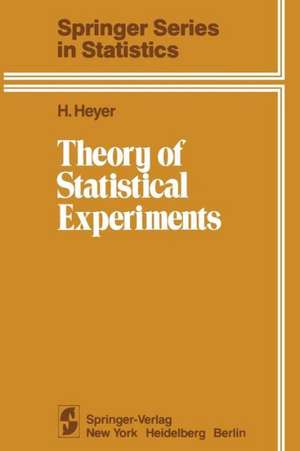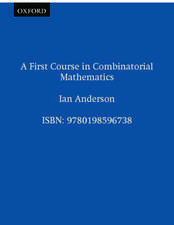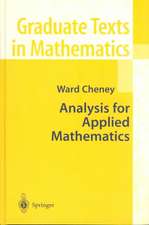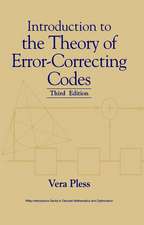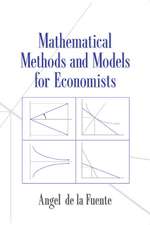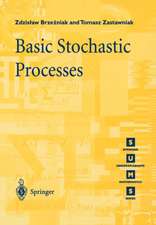Theory of Statistical Experiments: Springer Series in Statistics
Autor H. Heyeren Limba Engleză Paperback – 12 oct 2011
Din seria Springer Series in Statistics
- 14%
 Preț: 679.60 lei
Preț: 679.60 lei - 20%
 Preț: 630.98 lei
Preț: 630.98 lei - 20%
 Preț: 816.45 lei
Preț: 816.45 lei - 20%
 Preț: 1000.85 lei
Preț: 1000.85 lei -
 Preț: 390.84 lei
Preț: 390.84 lei - 20%
 Preț: 697.14 lei
Preț: 697.14 lei - 20%
 Preț: 445.20 lei
Preț: 445.20 lei - 20%
 Preț: 884.71 lei
Preț: 884.71 lei - 18%
 Preț: 1237.14 lei
Preț: 1237.14 lei - 18%
 Preț: 961.82 lei
Preț: 961.82 lei - 18%
 Preț: 956.50 lei
Preț: 956.50 lei - 18%
 Preț: 794.25 lei
Preț: 794.25 lei - 15%
 Preț: 648.05 lei
Preț: 648.05 lei - 18%
 Preț: 1217.10 lei
Preț: 1217.10 lei - 15%
 Preț: 646.11 lei
Preț: 646.11 lei - 15%
 Preț: 647.08 lei
Preț: 647.08 lei - 15%
 Preț: 646.11 lei
Preț: 646.11 lei - 18%
 Preț: 1329.76 lei
Preț: 1329.76 lei - 15%
 Preț: 652.81 lei
Preț: 652.81 lei - 18%
 Preț: 1114.52 lei
Preț: 1114.52 lei - 18%
 Preț: 952.40 lei
Preț: 952.40 lei - 18%
 Preț: 1333.42 lei
Preț: 1333.42 lei - 18%
 Preț: 1561.68 lei
Preț: 1561.68 lei - 18%
 Preț: 1231.47 lei
Preț: 1231.47 lei - 15%
 Preț: 513.64 lei
Preț: 513.64 lei - 18%
 Preț: 893.71 lei
Preț: 893.71 lei - 15%
 Preț: 649.87 lei
Preț: 649.87 lei - 18%
 Preț: 1007.65 lei
Preț: 1007.65 lei - 18%
 Preț: 1111.67 lei
Preț: 1111.67 lei - 18%
 Preț: 1223.70 lei
Preț: 1223.70 lei - 18%
 Preț: 892.74 lei
Preț: 892.74 lei - 18%
 Preț: 913.26 lei
Preț: 913.26 lei - 18%
 Preț: 943.88 lei
Preț: 943.88 lei -
 Preț: 391.61 lei
Preț: 391.61 lei -
 Preț: 391.22 lei
Preț: 391.22 lei - 18%
 Preț: 1331.18 lei
Preț: 1331.18 lei -
 Preț: 390.84 lei
Preț: 390.84 lei - 18%
 Preț: 888.45 lei
Preț: 888.45 lei - 18%
 Preț: 960.61 lei
Preț: 960.61 lei - 18%
 Preț: 1245.34 lei
Preț: 1245.34 lei - 18%
 Preț: 964.54 lei
Preț: 964.54 lei - 15%
 Preț: 643.16 lei
Preț: 643.16 lei - 18%
 Preț: 1723.76 lei
Preț: 1723.76 lei - 15%
 Preț: 643.84 lei
Preț: 643.84 lei - 15%
 Preț: 586.37 lei
Preț: 586.37 lei - 18%
 Preț: 999.59 lei
Preț: 999.59 lei - 15%
 Preț: 643.34 lei
Preț: 643.34 lei - 18%
 Preț: 806.40 lei
Preț: 806.40 lei - 18%
 Preț: 727.66 lei
Preț: 727.66 lei
Preț: 527.79 lei
Preț vechi: 620.94 lei
-15% Nou
Puncte Express: 792
Preț estimativ în valută:
100.100€ • 107.100$ • 84.21£
100.100€ • 107.100$ • 84.21£
Carte tipărită la comandă
Livrare economică 18 aprilie-02 mai
Preluare comenzi: 021 569.72.76
Specificații
ISBN-13: 9781461382201
ISBN-10: 1461382203
Pagini: 304
Ilustrații: X, 289 p.
Dimensiuni: 155 x 235 x 16 mm
Greutate: 0.43 kg
Ediția:Softcover reprint of the original 1st ed. 1982
Editura: Springer
Colecția Springer
Seria Springer Series in Statistics
Locul publicării:New York, NY, United States
ISBN-10: 1461382203
Pagini: 304
Ilustrații: X, 289 p.
Dimensiuni: 155 x 235 x 16 mm
Greutate: 0.43 kg
Ediția:Softcover reprint of the original 1st ed. 1982
Editura: Springer
Colecția Springer
Seria Springer Series in Statistics
Locul publicării:New York, NY, United States
Public țintă
ResearchCuprins
I. Games and Statistical Decisions.- § 1. Two-Person Zero Sum Games.- § 2. Concave-Convex Games and Optimality.- § 3. Basic Principles of Statistical Decision Theory.- II. Sufficient ?-Algebras and Statistics.- § 4. Generalities.- § 5. Properties of the System of All Sufficient ?-Algebras.- § 6. Completeness and Minimal Sufficiency.- III. Sufficiency under Additional Assumptions.- § 7. Sufficiency in the Separable Case.- § 8. Sufficiency in the Dominated Case.- § 9. Examples and Counter-Examples.- IV. Testing Experiments.- §10. Fundamentals.- §11. Construction of Most Powerful Tests.- §12. Least Favorable Distributions and Bayes Tests.- V. Testing Experiments Admitting an Isotone Likelihood Quotient.- §13. Isotone Likelihood Quotient.- §14. One-Dimensional Exponential Experiments.- §15. Similarity, Stringency and Unbiasedness.- VI. Estimation Experiments.- §16. Minimum Variance Unbiased Estimators.- §17. p-Minimality.- §18. Estimation Via the Order Statistic.- VII. Information and Sufficiency.- §19. Comparison of Classical Experiments.- §20. Representation of Positive Linear Operators by Stochastic Kernels.- §21. The Stochastic Kernel Criterion.- §22. Sufficiency in the Sense of Blackwell.- VIII. Invariance and the Comparison of Experiments.- §23. Existence of Invariant Stochastic Kernels.- §24. Comparison of Translation Experiments.- §25. Comparison of Linear Normal Experiments.- IX. Comparison of Finite Experiments.- §26. Comparison by k-Decision Problems.- §27. Comparison by Testing Problems.- §28. Standard Experiments.- §29. General Theory of Standard Measures.- §30. Sufficiency and Completeness.- X. Comparison with Extremely Informative Experiments.- §31. Bayesian Deficiency.- §32. Totally Informative Experiments.- §33. TotallyUninformative Experiments.- §34. Inequalities Between Deficiencies.- Notational Conventions.- References.- Symbol Index.
